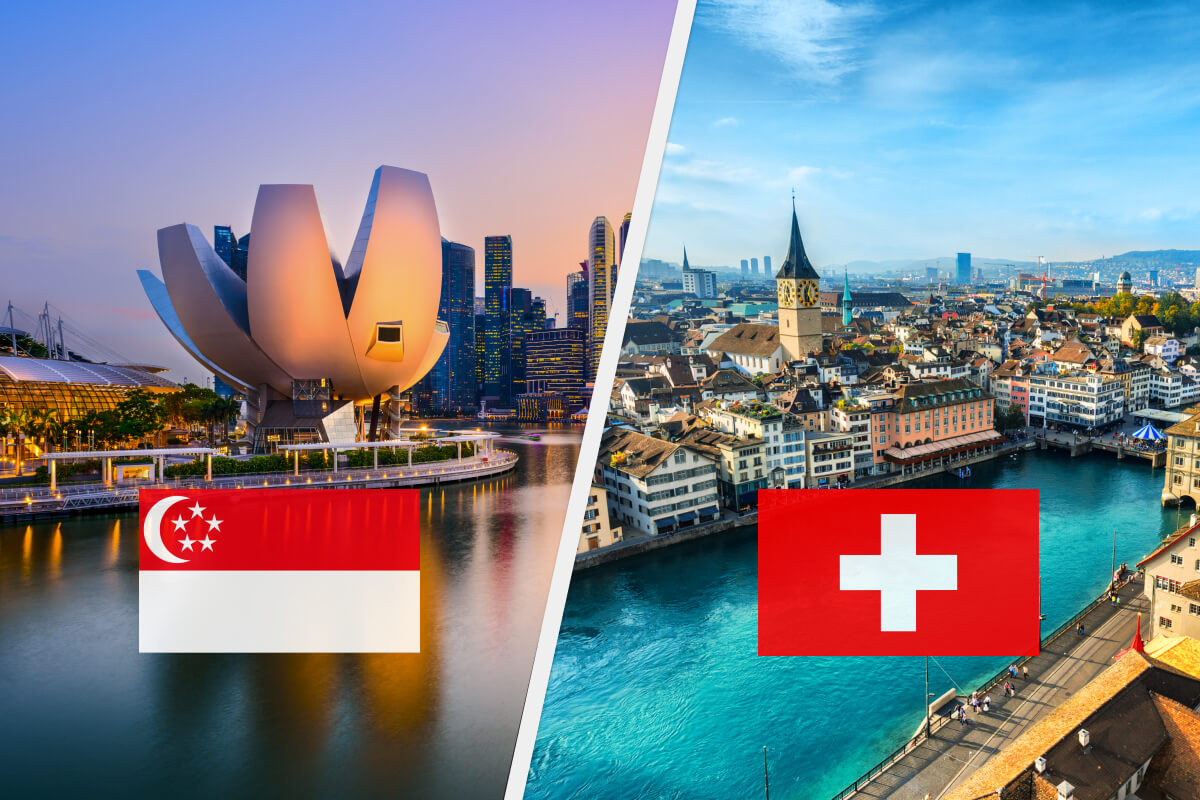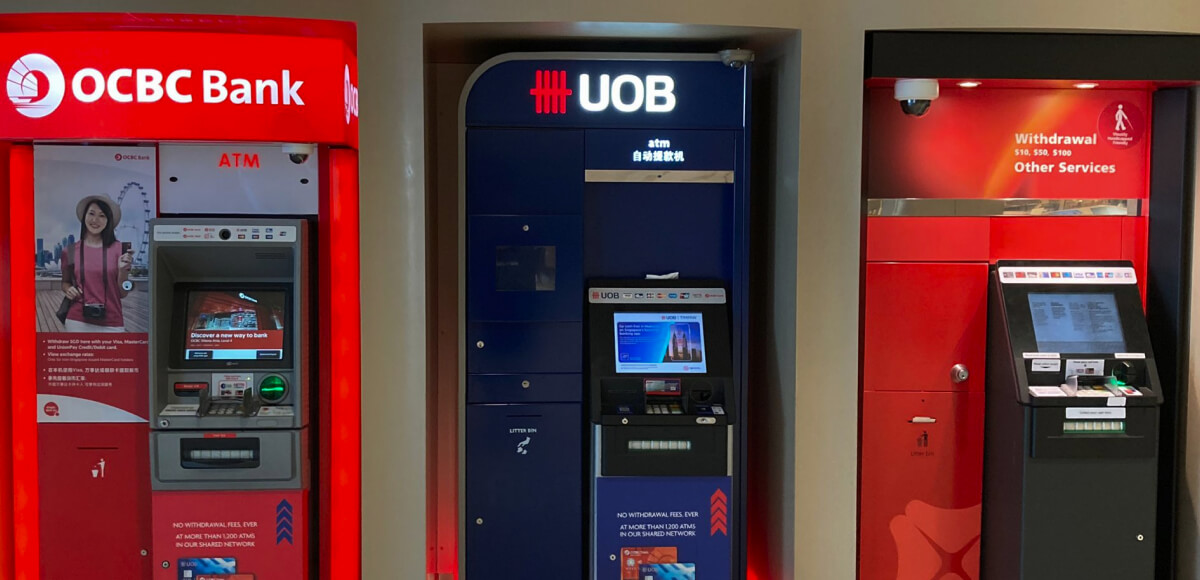
Where to Bank: Switzerland vs. Singapore for Global Investors
Switzerland and Singapore consistently rank among the top destinations for offshore banking, company formation, and wealth management. Both offer world-class financial institutions, economic stability, and attractive tax policies, making them prime choices for high-net-worth individuals (HNWIs) and global investors. Whether you’re looking for private banking, asset protection, or international business expansion, these two financial hubs stand out.
However, they operate under different regulatory frameworks, privacy laws, account opening processes, and residency programs. Understanding these differences is essential for choosing the right banking jurisdiction that aligns with your financial goals. Let’s break down how Switzerland and Singapore compare so you can determine the best fit for your wealth strategy.
Switzerland vs. Singapore: An Overview of Banking Environments

➞ Switzerland: The Private Banking world leader
Switzerland has been a global leader in private banking for over a century, attracting the world’s wealthiest individuals due to its financial security, discretion, and conservative banking practices. Its banking system is designed for long-term wealth preservation, offering clients a safe haven during geopolitical or economic instability.
▸ Swiss National Bank (SNB): Maintains strict monetary policies that ensure the Swiss franc remains one of the strongest and most stable currencies. The SNB is known for its independence and commitment to low inflation, making Swiss banks a reliable choice for those seeking asset protection.
▸ Major Financial Hubs: Zurich, Geneva, and Lugano are the core banking centers. Zurich leads in investment banking, Geneva specializes in private banking and wealth management, and Lugano has a strong presence in cross-border banking, particularly for European clients.
▸ Key Private Banks: UBS, Julius Baer, Lombard Odier, Pictet, and Credit Suisse (now part of UBS) are among the most renowned institutions catering to ultra-high-net-worth individuals (UHNWIs). These banks offer bespoke wealth management services, focusing on diversified investments, including gold, hedge funds, real estate, and art.
▸ Financial Philosophy: Swiss banking is known for conservative risk management, favoring capital preservation over high-risk growth strategies. Many Swiss banks hold significant gold reserves and provide clients with direct access to precious metals investments.
▸ Tax Advantages: While Switzerland has high living costs, certain cantons offer competitive tax structures for foreigners through lump-sum taxation agreements. This benefits wealthy individuals seeking residency while optimizing their tax exposure.
➞ Singapore: A Modern Financial Hub with Global Reach
Singapore has rapidly positioned itself as Asia’s premier financial center, attracting global investors with its pro-business environment, cutting-edge banking technology, and strong regulatory framework. It is now a key gateway for accessing high-growth markets across Southeast Asia and beyond.
▸ Monetary Authority of Singapore (MAS): Regulates the country’s banking system with strict yet business-friendly policies. Unlike many Western regulators, MAS actively collaborates with banks and fintech companies to maintain financial stability while fostering innovation.
▸ Major Financial Institutions: Leading banks include DBS (the largest Southeast Asian bank), UOB, OCBC, Bank of Singapore, and international players like Citi Private Bank and JP Morgan. Many global banks have their Asia-Pacific headquarters in Singapore, offering world-class private banking services.
▸ Wealth Management & Investment Opportunities: Singapore’s private banks provide access to global markets, with a focus on high-growth regions such as Indonesia, Vietnam, and China. The country is also a hub for hedge funds, family offices, and venture capital, making it ideal for investors looking to diversify into Asian emerging markets.
▸ Tax & Business Incentives:
・No capital gains tax and no estate duty, making it highly attractive for wealth structuring.
・Family Office Programs offer tax exemptions for HNWIs setting up investment structures in Singapore.
・Singapore Variable Capital Company (VCC): A flexible investment fund structure popular among hedge funds and wealth managers.
▸ Digital Banking & Innovation: Unlike Switzerland, which relies heavily on traditional banking relationships, Singaporean banks leverage digital banking, AI-driven wealth management, and blockchain technology to enhance efficiency and security. Many Singaporean banks allow remote account opening and digital asset management for global clients.
Banking Privacy and Confidentiality

➞ Swiss Banking Secrecy: Does It Still Exist?
Switzerland was once the gold standard for banking secrecy, attracting global wealth due to its strict confidentiality laws. However, international regulatory changes have significantly reshaped its privacy policies.
▸ The Swiss Banking Law of 1934 originally made it illegal for banks to disclose client information without consent, making Swiss accounts synonymous with secrecy.
▸ Due to mounting global pressure, particularly from the U.S. Foreign Account Tax Compliance Act (FATCA) and OECD Common Reporting Standard (CRS), Switzerland has adopted the Automatic Exchange of Information (AEOI) system, requiring banks to share financial data with tax authorities from over 100 jurisdictions.
▸ While Switzerland no longer offers absolute secrecy, Swiss banks still prioritize client discretion, ensuring that personal financial details are only disclosed under strict legal circumstances.
▸ Domestic banking privacy laws remain strong, meaning Swiss authorities will not release information without justified legal requests, such as criminal investigations or tax fraud cases.
▸ Many high-net-worth individuals still choose Swiss banks for structured wealth protection, asset management expertise, and the reputation of its financial institutions, rather than pure secrecy.
➞ Singapore’s Privacy Regulations: A Balanced Approach
Singapore maintains a strong stance on financial privacy while complying with global transparency initiatives. The country has positioned itself as a modern banking hub that balances discretion with regulatory obligations.
▸ Singapore has adopted AEOI, meaning financial institutions must report account details of foreign clients to their home countries’ tax authorities. However, Singapore ensures that data-sharing processes remain secure and controlled, avoiding unnecessary exposure.
▸ Unlike many Western jurisdictions, Singaporean banks do not publicly disclose personal financial data unless legally required.
▸ The country has strict banking confidentiality laws, making unauthorized data breaches or leaks a punishable offense under Singaporean law.
▸ Singapore’s Private Banking Code of Conduct ensures that high-net-worth clients receive an additional layer of privacy and protection when dealing with wealth management firms.
▸ While privacy is still a priority, Singaporean banks are subject to international compliance checks, particularly concerning anti-money laundering (AML) and counter-terrorism financing (CTF) regulations.
➞ Privacy Comparison: Switzerland vs. Singapore
▸ Switzerland still offers a higher level of discretion for clients within legal limits, especially for domestic banking. However, global compliance measures mean full secrecy no longer exists.
▸ Singapore provides a balance between maintaining client privacy and adhering to international tax regulations, making it a secure yet compliant banking destination.
▸ For those seeking strong privacy with a reputation for discretion, Switzerland remains slightly ahead. However, Singapore’s regulatory structure ensures modern banking security without unnecessary public disclosure.
Both jurisdictions uphold financial confidentiality, but neither offers complete secrecy due to global financial transparency initiatives. If privacy is a major concern, the choice depends on whether you prefer Switzerland’s traditional discretion with strict legal frameworks or Singapore’s efficient, structured, and well-regulated privacy protections.
Bank Account Opening: Requirements and Procedures

|
Feature |
Switzerland |
Singapore |
|
Documentation Required |
Passport, proof of address, source of funds, tax compliance documents |
Passport, proof of address, tax information, proof of wealth |
|
Minimum Deposit |
$500,000–$1 million (higher for premier services) |
S$100,000 to S$350,000 for private banking |
|
Ease of Account Opening |
Strict compliance, high entry threshold |
Streamlined process, easier for non-residents |
|
In-Person Requirement |
Often required, but some banks allow remote onboarding |
Many banks offer remote account opening for eligible clients |
|
Regulatory Environment |
Highly regulated, strong compliance checks |
Business-friendly with efficient regulatory framework |
|
Best For |
Ultra-high-net-worth individuals (UHNWIs) seeking wealth preservation and traditional private banking |
Investors and entrepreneurs looking for a modern, efficient banking experience with access to Asian markets |
Which Country Makes It Easier?
✓ Singapore generally offers a smoother and faster account opening process.
✓ Swiss banks have stricter compliance requirements and higher entry thresholds.
✓ If accessibility is a priority, Singapore is the better choice
Private Banking and Wealth Management

➞ Swiss Private Banking: Tradition and Expertise
Switzerland has set the global benchmark for private banking, offering exclusive wealth management services designed for long-term asset protection. Swiss private banks have built a reputation for stability, discretion, and high-touch advisory services, making them the go-to choice for ultra-high-net-worth individuals (UHNWIs).
▸ Focus on Asset Protection: Swiss private banks specialize in capital preservation, making them attractive for individuals seeking low-risk, long-term investment strategies. Many clients choose Swiss banks to safeguard assets from political or economic instability in their home countries.
▸ Diverse Investment Portfolio: Clients benefit from access to alternative investments such as physical gold storage, rare art collections, fine wine portfolios, private equity, and hedge funds. Switzerland remains one of the world's largest gold trading hubs, and many banks offer direct access to gold reserves.
▸ Tailored Wealth Structuring: Swiss banks work with family offices, trust structures, and tax advisors to optimize estate planning, succession management, and international wealth transfers. Banks like Julius Baer and Lombard Odier specialize in multigenerational wealth planning.
▸ Premium Costs & Entry Requirements: The exclusivity of Swiss private banking comes with high minimum deposit requirements, typically starting at $1 million, with some private banks catering only to UHNWIs with $5 million or more. Annual management fees are also among the highest globally, reflecting the premium services provided.
▸ Confidentiality Within Regulations: While full secrecy no longer exists, Swiss private banks still provide strong client discretion, with banking data only shared under strict regulatory conditions.
➞ Singapore Private Banking: Modern and Tech-Driven
Singapore has emerged as Asia’s wealth management powerhouse, combining cutting-edge financial services with access to some of the world’s fastest-growing markets. The country has become a hub for global investors who want dynamic investment opportunities and efficient wealth management solutions.
▸ Access to High-Growth Markets: Unlike Switzerland, which focuses on preserving wealth, Singapore is designed for wealth growth. Private banks here provide exposure to high-yield opportunities in China, Indonesia, Vietnam, and India, particularly in technology, real estate, and private equity.
▸ Integration of Fintech & Digital Assets: Singapore’s private banks leverage AI-driven portfolio management, digital investment platforms, and blockchain-based wealth solutions. Many institutions, such as DBS Private Bank, offer cryptocurrency custody services, allowing clients to diversify into digital assets.
▸ Lower Entry Barriers & Tax Benefits: The minimum deposit requirements for private banking in Singapore are lower than Switzerland, with some banks requiring S$350,000 to $750,000. Additionally, Singapore has no capital gains tax or estate duties, making it attractive for global investors.
▸ Innovative Family Office Ecosystem: Singapore has positioned itself as a top jurisdiction for family offices, offering tax exemptions under the 13X and 13R schemes for wealthy individuals setting up family funds. This has drawn many Chinese, Indian, and Middle Eastern billionaires to the city-state.
Residency and Banking Access

➞ Switzerland: Residency Through Wealth
Switzerland offers residency options for wealthy individuals willing to make a significant financial contribution. The Lump-Sum Taxation system allows foreign nationals to gain Swiss residency if they agree to pay a negotiated annual tax, typically ranging from CHF 150,000 to CHF 1 million, depending on the canton. This system is particularly attractive to high-net-worth individuals who prefer a stable European base with strong asset protection.
Obtaining permanent residency in Switzerland requires at least 10 years of continuous residence, while citizenship takes 12 years. The process is stringent, with language and integration requirements, but those who qualify gain access to Schengen travel, a high standard of living, and a world-class financial system.
➞ Singapore: Global Investor Programme (GIP)
For investors and entrepreneurs looking to establish a presence in Asia, Singapore’s Global Investor Programme (GIP) provides a direct path to permanent residency. To qualify, applicants must invest SGD 10 million in a business or at least SGD 25 million in an approved investment fund. Unlike Switzerland, Singapore’s residency program is designed to attract business owners and institutional investors, providing them with tax benefits, easier company formation, and access to Southeast Asia’s thriving markets.
Permanent residents in Singapore benefit from a pro-business regulatory environment, no capital gains tax, and no estate duty. Unlike Switzerland’s long naturalization process, Singapore offers a faster pathway to integration, making it an appealing choice for those looking to expand their global business footprint.
Which Banking Hub Is Right for You?

Switzerland and Singapore both stand at the top of the global banking game, but the right choice depends on what you’re looking for. If your priority is wealth preservation, financial privacy, and a banking system that has stood the test of time, Switzerland is hard to beat.
Its reputation for stability, exclusive private banking, and alternative investments like gold and fine art make it the go-to destination for those who want to protect their assets for generations.
Singapore, on the other hand, is built for those who thrive on growth, innovation, and global market access. As Asia’s premier financial hub, it offers seamless banking experiences, cutting-edge fintech solutions, and direct exposure to high-growth markets.
With no capital gains tax, pro-business policies, and a streamlined residency program, Singapore is ideal for entrepreneurs and investors looking to expand their reach.
For those who don’t want to choose just one, a diversified approach can be the best strategy. Many high-net-worth individuals leverage Switzerland for asset protection and long-term security, while using Singapore as a launchpad for investment opportunities in Asia. The smartest move is knowing how to make both work in your favor.


